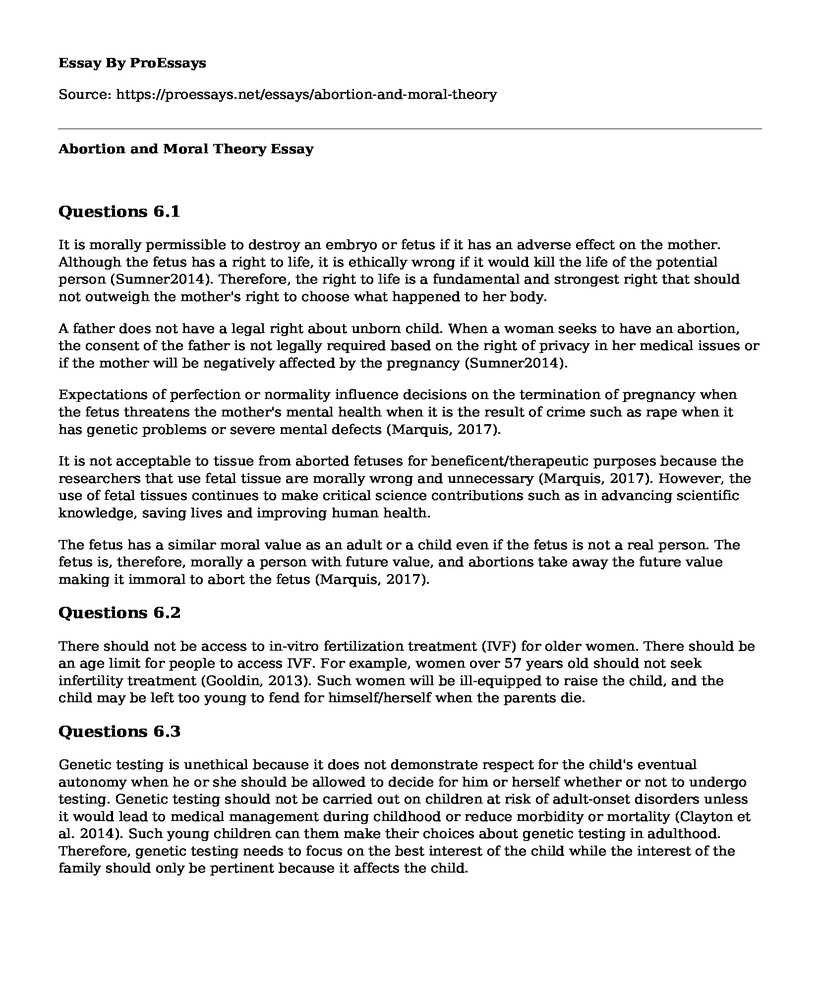Questions 6.1
It is morally permissible to destroy an embryo or fetus if it has an adverse effect on the mother. Although the fetus has a right to life, it is ethically wrong if it would kill the life of the potential person (Sumner2014). Therefore, the right to life is a fundamental and strongest right that should not outweigh the mother's right to choose what happened to her body.
A father does not have a legal right about unborn child. When a woman seeks to have an abortion, the consent of the father is not legally required based on the right of privacy in her medical issues or if the mother will be negatively affected by the pregnancy (Sumner2014).
Expectations of perfection or normality influence decisions on the termination of pregnancy when the fetus threatens the mother's mental health when it is the result of crime such as rape when it has genetic problems or severe mental defects (Marquis, 2017).
It is not acceptable to tissue from aborted fetuses for beneficent/therapeutic purposes because the researchers that use fetal tissue are morally wrong and unnecessary (Marquis, 2017). However, the use of fetal tissues continues to make critical science contributions such as in advancing scientific knowledge, saving lives and improving human health.
The fetus has a similar moral value as an adult or a child even if the fetus is not a real person. The fetus is, therefore, morally a person with future value, and abortions take away the future value making it immoral to abort the fetus (Marquis, 2017).
Questions 6.2
There should not be access to in-vitro fertilization treatment (IVF) for older women. There should be an age limit for people to access IVF. For example, women over 57 years old should not seek infertility treatment (Gooldin, 2013). Such women will be ill-equipped to raise the child, and the child may be left too young to fend for himself/herself when the parents die.
Questions 6.3
Genetic testing is unethical because it does not demonstrate respect for the child's eventual autonomy when he or she should be allowed to decide for him or herself whether or not to undergo testing. Genetic testing should not be carried out on children at risk of adult-onset disorders unless it would lead to medical management during childhood or reduce morbidity or mortality (Clayton et al. 2014). Such young children can them make their choices about genetic testing in adulthood. Therefore, genetic testing needs to focus on the best interest of the child while the interest of the family should only be pertinent because it affects the child.
Questions 6.4
Although our ever-increasing knowledge concerning genes and genetic technology does enhance choice, however, it does raise ethical concerns. It is not right to manipulate human genes since it is not right to play God by altering aspects of human makeup. Genetic engineering also leads to side effects such as it changes embryo before the differentiation into reproductive and non-reproductive cells, which affects all future offspring of an individual (Ames et al. 2015). This leads to a significant ethical distinction, which brings in the objection of gene therapy on moral grounds.
References
Ames, A.G., Metcalfe, S.A., Archibald, A.D., Duncan, R.E. and Emery, J., 2015. Measuring informed choice in population-based reproductive genetic screening: a systematic review. European Journal of Human Genetics, 23(1), p.8.
Clayton, E.W., McCullough, L.B., Biesecker, L.G., Joffe, S., Ross, L.F., Wolf, S.M. and For the Clinical Sequencing Exploratory Research (CSER) Consortium Pediatrics Working Group, 2014. Addressing the ethical challenges in genetic testing and sequencing of children. The American Journal of Bioethics, 14(3), pp.3-9.
Gooldin, S., 2013. 'Emotional rights,' moral reasoning, and Jewish-Arab alliances in the regulation of in-vitro-fertilization in Israel: Theorizing the unexpected consequences of assisted reproductive technologies. Social Science & Medicine, 83, pp.90-98.
Marquis, D., 2017. Why abortion is immoral. Applied Ethics: A Multicultural Approach, p.367.
Sumner, L.W., 2014. Abortion and moral theory. Princeton University Press.
Cite this page
Abortion and Moral Theory. (2022, Mar 29). Retrieved from https://proessays.net/essays/abortion-and-moral-theory
If you are the original author of this essay and no longer wish to have it published on the ProEssays website, please click below to request its removal:
- Why Are Personal Affiliation and Networking Necessary for a Nursing Leader?
- Autophagy-Related Protein Expression Paper Example
- Pediatrics: Common HEENT Disorders & Symptoms for Diagnosis - Essay Sample
- Essay Sample on Nursing: Critical Thinking & Innovative Learning Methods for Quality Care
- Regulatory Affairs: Ensuring Compliance & Guiding Corporations - Essay Sample
- Virgin Australia Collapses: Unseen Cause of Troubles Revealed - Essay Sample
- Research Paper Example on Safe Vaccines for Global Health: Mitigating Infectious Disease Risks







